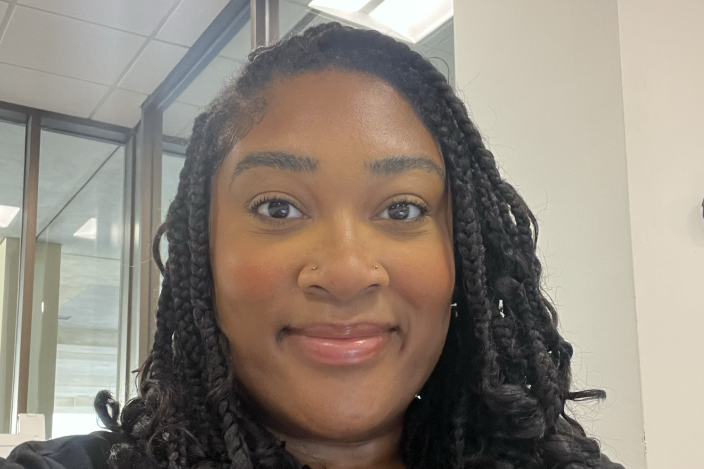
Daniella Michel '25
Daniella Michel '25, a Boston native and senior informatics major in the Manning College of Information and Computer Sciences (CICS), discovered CICS Teaching Faculty Shiobhan Meï’s Rendering Revolution project through an email announcing an independent study opportunity weaving together human-computer interaction, digital archiving, and cultural history. The project, a queer, bilingual, and feminist experiment in digital interdisciplinary research using the lens of fashion and material culture to trace the aesthetic, social, and political reverberations of the Haitian Revolution, immediately captured her attention. For Daniella, the chance to contribute to a multidisciplinary initiative that connected computing with storytelling, identity, and diasporic memory felt deeply personal.
Eager to engage in work that reflected both her academic interests and her Haitian heritage, Daniella brought her technical expertise, creative vision, and cultural insight to the team and helped shape an intuitive and visually compelling digital archive that not only preserves historical narratives but also amplifies the revolutionary spirit of Haiti's past and its ongoing influence on contemporary art and fashion.
Was there a steep learning curve when applying your informatics skills in a digital humanities context?
I hadn’t worked on a web development project in some time, but I saw this as an opportunity to refresh my skills and expand my experience in the field. While I had taken courses in web development, applying those skills in a digital humanities context was a new challenge. I also hadn’t done humanities-based research in a while, but my personal connection to its culture and history made this project especially meaningful.
Another challenge was shifting from a data-driven mindset to one focused on storytelling and user engagement. I’m used to thinking about functionality and analysis, but this project required me to consider how people interact with history through design. However, engaging with the exhibition’s themes pushed me to think beyond just functionality and consider how digital tools can enhance storytelling and accessibility.
What aspects of Rendering Revolution resonated with you the most?
As someone with a data science background, what resonated with me most was how digital tools could enhance storytelling and preserve history in an accessible way. The project initially used Instagram to share knowledge about the Haitian Revolution, making it more digestible for a broad audience. However, there was a desire for a dedicated space where this history could be archived and explored in greater depth. While there are scholarly articles on the topic, not everyone has the time or ability to read through dense academic texts.
Digital archives make histories like the Haitian Revolution more accessible and engaging by offering multiple ways to interact with the content. This format allows people to either delve deeper into the history or absorb smaller, more digestible snippets of knowledge. By making information more palatable, the archive ensures that the Haitian Revolution’s impact on art, fashion, and culture is recognized and preserved for a wider audience.
This shift showed me how digital platforms can serve different purposes. Social media can spread awareness quickly, while a structured digital archive allows for deeper engagement. Seeing how technology could bridge gaps in historical understanding, particularly for underrepresented narratives, reinforced my belief in the importance of digital archives. It also pushed me to think critically about user experience, functionality, and accessibility in a way that was deeply personal.
I’ve always been interested in ethical computing, but this project also reinforced how technology can be used to amplify underrepresented histories and strengthened my ability to collaborate across disciplines, balancing historical accuracy, user experience, and technical design. This experience also influenced my decision to join URV, where I focused on AI that helps individuals with disabilities gain independence, reinforcing my passion for ethical computing and inclusive technology.
What advice would you give other CICS students who have not considered participating on interdisciplinary, humanities-related projects?
I would encourage CICS students to step outside their comfort zones and explore interdisciplinary projects, even if they don’t seem directly related to their field. Working on Rendering Revolution showed me that technology isn’t just about solving technical problems. Humanities-related projects offer a chance to apply technical skills in creative ways and gain a new perspective on how technology impacts people’s lives. These experiences can help you think more critically about ethical computing, user engagement, and inclusivity, which are valuable in any tech career.
What’s been the most rewarding part of this experience for you?
The most rewarding part has been seeing how my technical skills can be used beyond traditional data science applications. Rendering Revolution and my work with URV opened my eyes to the ways technology can amplify underrepresented histories and improve accessibility. This experience reaffirmed my passion for ethical computing and made me more intentional about the kind of impact I want to have in my field. It also pushed me to collaborate with people from different backgrounds, which was both inspiring and eye-opening. Looking back, I’m grateful for the opportunities that challenged me to think beyond code and data, shaping me into a more well-rounded and thoughtful technologist.